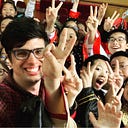Member-only story
I’m a Politics Teacher in China
And no, I’m not writing this from prison
Three years ago, when I was first employed by the education provider I work for in Shanghai, it was as a drama teacher.
Originally, the company I work for was an employer of and agent for ESL teachers but had decided to expand into drama to get an edge over the competition.
In a strategic move, the company invested in a partnership with a Hong Kong-based drama education company so that they could licence educational material and poach new teachers.
Even though I was living in New Zealand at the time, I was hired by the Hong Kong company and sold to Shanghai as part of the arrangement. I was pioneering its brand new drama program, and I was excited.
Skip forward a year and drama had significantly lost its shine. In a country that prioritises utility above creative expression, parents weren’t willing to pay big bucks to see their child “prance around” on stage.
Students in China go to school and third party learning centres seven days a week, so every second of their time is valuable. I saw the writing on the wall and knew that I had to make the jump out of drama if I wanted to keep my job and my new life in China.
